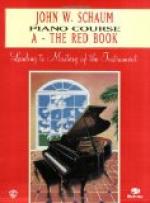“If pupils have naturally a poor sense of rhythm, there is no remedy equal to practising with a metronome, using this instrument of torture daily until results are evident, when, of course, there must be a judicious slowing down in its use. The mechanical sense of rhythm, the ability to count three or four to a measure, and to group the notes of a piece correctly, can be taught to any person, if one has the patience; but for those delicate rhythmic nuances required by a Chopin mazurka or a Viennese waltz, a specific rhythmic gift must be possessed by the pupil.
“Leschetizky says little to his pupils on the subject of technic; I cannot remember his having spoken a dozen words to me on the subject, during all the time I have known him. His interest, of course, lies wholly in the matter of interpretation, and technic comes into consideration only as a means and never as an end.
“Leschetizky likes to have the player talk to him, ask questions, do anything but sit still and not speak. ’How do I know you comprehend my meaning,’ he asks, ’that you understand what I am talking about, if you say nothing?’ At first a student may be silent from nervousness, but if he is bright he will soon ‘catch on,’ and see what is expected of him. Leschetizky says sometimes: ’When the Lord made the ten commandments He omitted the eleventh, “Thou shalt not be stupid."’ If one is not very quick, one may have a hard time with this master.
“As a high school in technic I use Joseffy’s School of Advanced Piano Playing with my pupils. This work leads to the highest possible technical development at the keyboard, and I consider it the last word in piano technic. The hundreds of exercises have been devised with most wonderful ingenuity, and the musicianship of the author stands out on every page. The book is not a dry series of technics but has vital connection with all the big technical problems found in the literature of the piano.
“In teaching, I consider a second piano an absolute necessity. There are so many things in piano playing which cannot be put into words, and the teacher must constantly illustrate. How can one teach the interpretation of a Chopin nocturne, for instance, by merely talking about it. I can say, ‘play loud here—soft there’; but how far do such directions go toward an artistic conception of the piece? One cannot indicate the swell of a melody, the tonal and rhythmic nuance of a groupetto—and a thousand other things in any other way than by the living example. Through imitation one learns rapidly and surely, until one reaches the point where the wings of one’s own individuality begin to sprout.




